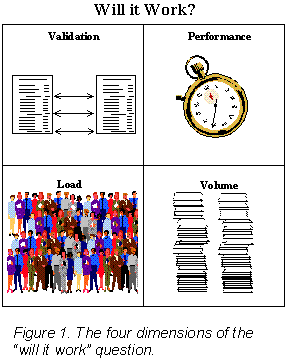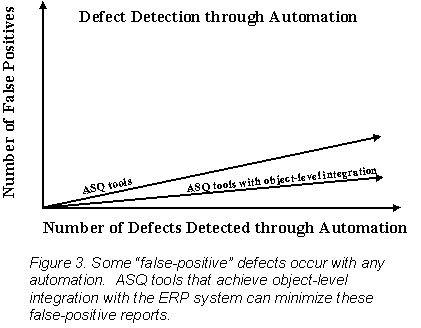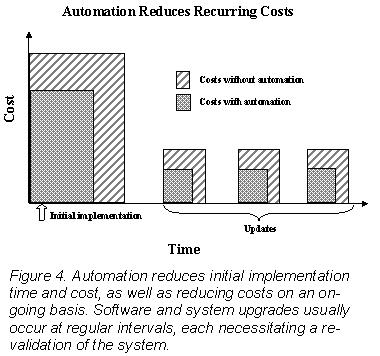

Rational Software Corporation
20 Maguire Road
Lexington, MA 02173
Phone: (781) 676-7666
Fax: (781) 676-7640
E-mail: bthornburg@rational.com
Table of Contents
Will It Work in my environment?
Validation: Manual versus Automated
Automation in ERP Validations – Summary
Implementing packaged enterprise resource planning (ERP) applications, such as those offered by SAP, PeopleSoft, Oracle, and BAAN requires significant resources to install, model business processes, connect to legacy systems, and upgrade. While the suppliers of these applications extensively test them before customers use them, implementing organizations must still validate that these applications conform to business rules and operate correctly and efficiently. Implementation teams traditionally perform this validation process manually, which has inherent disadvantages in coverage, scaleability, and repeatability. This paper discusses the use of automated software tools for validating ERP implementations and the benefits that accrue to organizations that elect to use automation in their validation process.
Organizations spend months deciding how to upgrade their information systems. They sort through the many potential implementation partners and select one with the people and methodology to match their implementation. Now for the tough part – implementing and testing the results. Implementation teams face two fundamental questions:
Packaged ERP vendors extensively test and validate the operation of their software. However, with tailoring options available in these applications, there are millions of different ways an organization can operate them. These drive the need for validation of any packaged ERP implementation – from a new installation to a routine software upgrade. Add to these the different ways that an organization can populate these applications with information. Now add the differences they can introduce when integrating with legacy applications, and you have the formula for a complex and time consuming implementation process – one that demands results validation.
The software development industry has proven methodologies and software products for validation of complex systems called automated software quality (ASQ) products. These products, with extensions specifically designed for ERP applications, help raise the quality of ERP implementations. They help assure implementation success by reducing surprises and discovering defects earlier in the implementation process, leading to on-budget and on-time completion.
Will It Work in my environment?
Packaged ERP implementations can be complex. Besides the business modeling requirements, potential organizational process changes, conversion of information from legacy systems and user training, there are risks that the system will not perform as expected when tested in "real-life" situations. Every organization is different, and will stress the system in different ways. The real question is whether the system is set up correctly to ensure efficient and effective processing. There are four dimensions to the "will it work" question:

Validation: Manual versus Automated
Organizations can use two different methods to confirm that packaged ERP implementations operate as expected in their environment – manual and automated. The traditional method is manual – bring users in for an extended period of "hands-on" use, where they are trained on the new system and validate that it performs as expected. Automated validation offers a new approach to confirming proper operation.
Manual validation has four disadvantages:
The software applications development industry has two well-defined methodologies for determining both whether the system operates and continues to operate correctly, and how well it will operate with all the users accessing it. The first, which detects change-introduced defects is called regression testing. This is the process of recording all the previously performed business logic validation steps, and automatically performing them again as developers change the system.
The second methodology for validating ERP operation is called performance testing. This is the process of creating a realistic load on the system by simulating many users. Since these users are simulated in software, implementation teams that use performance testing software don’t require hundreds or thousands of "live" users to know, in advance, the performance of the system when it goes live.
Regression testing addresses the "Does it support my business processes" question. Implementation teams often devote much of the validation effort to re-running previous validation tests – i.e. performing regression tests to assure that none of the changes cause defects in another part of the system. These sorts of operations, repeated under different conditions, lend themselves well to automation.
Automated validation of ERP implementations employs the same methodology. The implementation team designs validation steps and records them for use in regression tests. They can design these tests to cover the complete range of application functionality. Recording enables them to play them back in regression tests and assure that system changes do not adversely affect other system components.
The record/playback process is usually performed with third-party ASQ tools. These tools perform non-intrusive recording of normal user actions – the same steps a manual tester would perform. Users navigate through the system and insert "test cases" – selected places where the recording software should compare the ERP operation with baseline operation. This might be examination of a field for a specific value, examination of a table for a specific collection of values, or review of a report for specific information.
 During playback, the ASQ tool automatically supplies the appropriate keystrokes and mouse clicks to the ERP application, which performs the exact same steps as the manual test performed. The ASQ tool automatically verifies test cases for correct value(s) and systematically steps through the ERP application like the manual tester. The difference is that implementation teams can run these tests repeatedly without manual intervention, while making changes to other parts of the system, and insure that changes don’t have ripple-through affects.
During playback, the ASQ tool automatically supplies the appropriate keystrokes and mouse clicks to the ERP application, which performs the exact same steps as the manual test performed. The ASQ tool automatically verifies test cases for correct value(s) and systematically steps through the ERP application like the manual tester. The difference is that implementation teams can run these tests repeatedly without manual intervention, while making changes to other parts of the system, and insure that changes don’t have ripple-through affects.
Part of the playback process is verification of test cases, and ASQ tools usually include a comprehensive defect tracking and reporting system for acting on system events that cause differences in operation.
A key to successful use of automation in business logic validation is correctly detecting and reporting bona-fide defects while ignoring, or at least suppressing, application changes that don’t affect operation. The operation of ERP applications can change for a host of different reasons – new data, changed operation, different user privileges, etc, and the challenge in using automation is detecting and acting upon the changes that represent true defects. ASQ tools use various strategies to mitigate reporting "false positive" defects. The most successful are ones that are the result of a technical integration of the ASQ tool with the ERP application. Those that use object-level integration have a better understanding of the ERP application, and therefor can mitigate the "false positive" defect reports, while maximizing the true defect detection.
Automated validation has four advantages over manual processes:
The second methodology for validating system operation addresses the "Will it work in my environment" question. Performance testing is vital because virtually every organization’s environment is different. While the ERP vendors guarantee functional operation of their systems, they cannot guarantee the performance characteristics of these systems when they operate in different hardware, software and network infrastructure environments.
Performance testing generates a realistic system load through a variety of approaches, then measuring the system response to this load and comparing it to required performance parameters. Implementation teams may select several different methods for validating system performance:
 In the rush to implement, organizations sometimes fail to plan for the continued upgrade and maintenance of these systems. Packaged ERP applications operate in multi-vendor environments, where the combined total of software and hardware upgrades can mean frequent changes – as often as every calendar quarter. ERP applications need validation with any change to the components – not just packaged ERP software upgrades, but upgrades to the underlying database, network infrastructure and operating hardware.
In the rush to implement, organizations sometimes fail to plan for the continued upgrade and maintenance of these systems. Packaged ERP applications operate in multi-vendor environments, where the combined total of software and hardware upgrades can mean frequent changes – as often as every calendar quarter. ERP applications need validation with any change to the components – not just packaged ERP software upgrades, but upgrades to the underlying database, network infrastructure and operating hardware.
Implementations that employ automation for validation have built-in methods for validation at any point in the future. You can use the same suites of tests that certify the system before live use to validate the correct operation of the system after any system maintenance – upgrades, new configurations, and changes. In a matter of hours, you can verify that the change that was "invisible to the end user" really has no effect.
Automation in ERP Validations – Summary
Experienced implementers use repeatable processes for ERP implementations. Automated validation can be a vital part of a successful implementation when employed early in the process. Organizations elect to use automated validation tools during initial ERP implementations and as part of upgrade processes. Through the use of these tools, organizations can finish implementations sooner and reduce the risk inherent in these large-scale projects.
Automation tools help implementation teams finish sooner by uncovering defects earlier in the process, and assuring that changes don’t introduce unintended results. These same tools reduce the risk of any implementation by thoroughly testing the applications in real-life scenarios that range from tests that insure the applications support the business logic to tests that assure the applications perform with adequate performance.
SQA Suite is Rational’s premier automated testing toolset. It has received more industry awards than any other automated software quality solution. It has won the PC Week Labs’ Corporate IT Excellence (ITX) Award, PC Week Labs’ Analyst Choice Award, the PowerBuilder Developer’s Journal Product Excellence Award twice, the 1994, 1995, and 1996 DBMS Readers’ Choice Award, and three Software Development Productivity Awards. SQA Suite includes technical integrations with SAP, PeopleSoft, and Oracle Applications, among others.
About Rational Software Corporation
Rational Software Corporation (NASDAQ: RATL) develops, markets, and supports a comprehensive solution that automates the component-based development of software. Rational's solution includes an integrated family of products that automate development and quality assurance throughout the software lifecycle, a software process that can be configured to the specific needs of customers, and a range of consulting and support services. For more information on Rational's products and services, visit Rational's Web site at www.rational.com.